|
33 degrees Celsius, 93 Fahrenheit, summer in the South Pacific and somebody is dreaming of a White Christmas, time to write our report for this year. After our extensive travels last year, see Report 2015, we had planned to stay here and tend to house and garden.
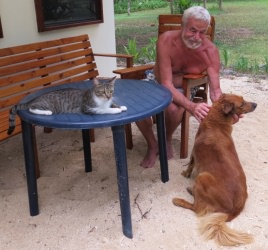 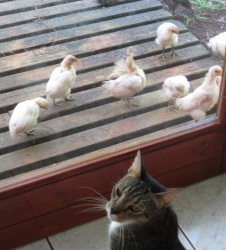 The last cyclone season from November 2015 to April 2016 was characterized by a very strong El Nino effect, the predictions were for more and stronger cyclones to occure in Tonga, but until the end of the last year everything stayed calm. The last cyclone season from November 2015 to April 2016 was characterized by a very strong El Nino effect, the predictions were for more and stronger cyclones to occure in Tonga, but until the end of the last year everything stayed calm.
All our neighbors on the island were gone, the dog, cats and chickens crowding around us. We had a quiet Christmas and New Year's Eve, but on the first day of 2016 cyclone ULA approached and was supposed to pass by Vava'u with up to 115 knots (200 km/h-125mph). We put on the cyclone shutters, brought the boat into the sheltered Hunga Lagoon, took down the solar panels and secured everything. In the night, the storm passed through with howling winds and a lot of rain, but only a few old trees came down and some banana plants, no major damages. The next two weeks passed by with the usual activities in house and garden. It was pretty hot, which limited our activities somewhat, spiders and heron were still busy.
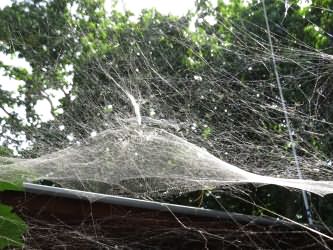 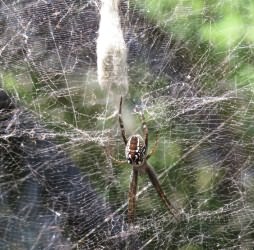 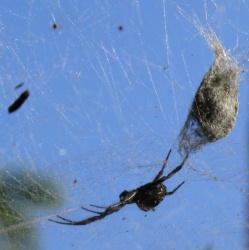 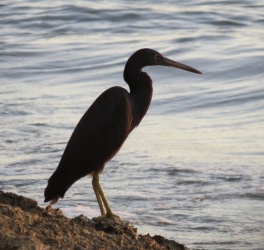
On Thursday, January 14., we went into town to get supplies, in the evening we watched a movie at home. Then I noticed colorful flashes in my right eye when I moved my head fast. First I thought it was light reflection in my glasses, but when it happened later in a dark room with my eyes closed, I found it quite irritating. The next day I also noticed dark shapes floating through my eye. Saturday it wasn't any better and I started worrying. Since the neighbor was not there, we had no Internet, so I consulted my old "medical bible", the Merck (MSD) manual, which stated, that flashes and so-called mouche volantes, were signs of a starting retinal detachment, which leads to blindness in a short time, if it is not quickly and expertly operated.
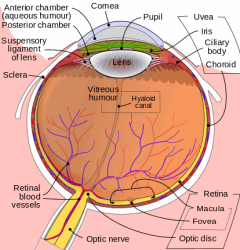 I had to make a quick decision. If I took it lightly and was later blind in one eye, I could never forgive myself. On the other hand, with the neighbors still away, Werner was alone on the island. Fortunately, the Canadians Cindy and Barry, who live on the neighboring island of Hunga, and their helper Patrick, a nice Swiss, were still there. On the weekend nothing happens in Tonga, so we went to Neiafu on Sunday afternoon, where I could book a domestic flight to the main island Tongatapu for early Monday morning. There I went straight to the hospital in Nuku'alofa, where two doctors examined my eye with three different instruments after they had put very old eye drops in my eyes. They confirmed my suspicion but they couldn't do anything. I decided to fly via New Zealand to Germany. I had to wait a full day until I could fly out, every hour tearing on my nerves. After the flight to New Zealand and half a night at the airport I could still see, so I proceeded on to Hong Kong and Germany. Every so often lifting my black eyepad to check if I could still see. On Thursday morning, 6 o'clock European time, I arrived in Zürich and two hours later in the eye clinic in my hometown Tuttlingen. There, the eye was thoroughly examined by a woman doctor, again examined by someone else and in the end, the eye specialist himself had a look. Then he said very briefly, "This is not a retinal detachment, only a vitreous detachment, not very harmful, lots of old people have that". He made the impression, that he shouldn't be bothered with such a silly situation. Despite my relief, I felt a bit lectured. Then I was told by someone else, that a detachment of the vitreous body could also trigger a retinal detachment later, so I should remain in Germany for a while, to be sure everything is ok. After 5 days of travel, all the excitement, the expensive flights, the great mental tension, jet lag and sleep deficiency, and still half blind from the eye drops, I was just glad that my dad and my brother Ingo were there to take care of me. (Picture left and more info see Wikipedia) I had to make a quick decision. If I took it lightly and was later blind in one eye, I could never forgive myself. On the other hand, with the neighbors still away, Werner was alone on the island. Fortunately, the Canadians Cindy and Barry, who live on the neighboring island of Hunga, and their helper Patrick, a nice Swiss, were still there. On the weekend nothing happens in Tonga, so we went to Neiafu on Sunday afternoon, where I could book a domestic flight to the main island Tongatapu for early Monday morning. There I went straight to the hospital in Nuku'alofa, where two doctors examined my eye with three different instruments after they had put very old eye drops in my eyes. They confirmed my suspicion but they couldn't do anything. I decided to fly via New Zealand to Germany. I had to wait a full day until I could fly out, every hour tearing on my nerves. After the flight to New Zealand and half a night at the airport I could still see, so I proceeded on to Hong Kong and Germany. Every so often lifting my black eyepad to check if I could still see. On Thursday morning, 6 o'clock European time, I arrived in Zürich and two hours later in the eye clinic in my hometown Tuttlingen. There, the eye was thoroughly examined by a woman doctor, again examined by someone else and in the end, the eye specialist himself had a look. Then he said very briefly, "This is not a retinal detachment, only a vitreous detachment, not very harmful, lots of old people have that". He made the impression, that he shouldn't be bothered with such a silly situation. Despite my relief, I felt a bit lectured. Then I was told by someone else, that a detachment of the vitreous body could also trigger a retinal detachment later, so I should remain in Germany for a while, to be sure everything is ok. After 5 days of travel, all the excitement, the expensive flights, the great mental tension, jet lag and sleep deficiency, and still half blind from the eye drops, I was just glad that my dad and my brother Ingo were there to take care of me. (Picture left and more info see Wikipedia)
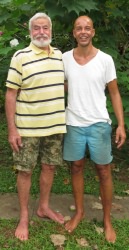 The weeks in Germany passed quickly, In Tonga Patrick had now moved to Werner and helped him to keep in touch with me by email. Karyn, Boris and the kids from next door had also come back, so I did not have to worry about Werner. The weeks in Germany passed quickly, In Tonga Patrick had now moved to Werner and helped him to keep in touch with me by email. Karyn, Boris and the kids from next door had also come back, so I did not have to worry about Werner.
In early February, Germany celebrated Carnival. In the south-west of Germany, we call it the Swabian-Alemannic Fasnet. Each village has its own figures and costumes, witches, gnomes, music bands and colorful carriages. I visited the parades in Tuttlingen and Wurmlingen.
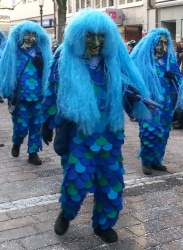 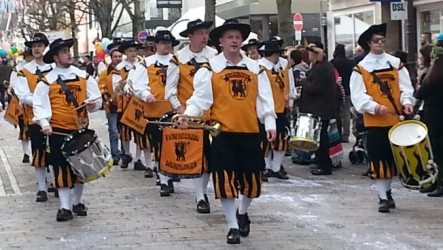 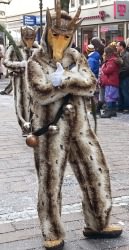 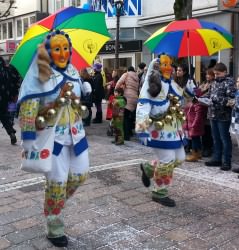 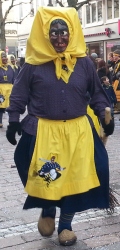
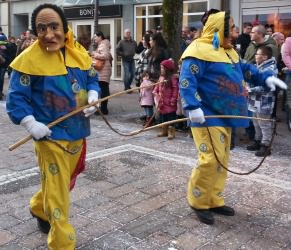 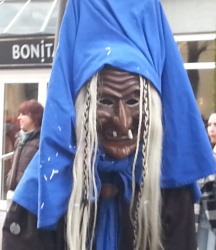 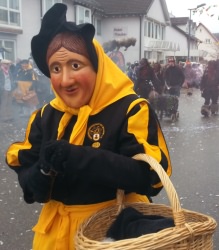 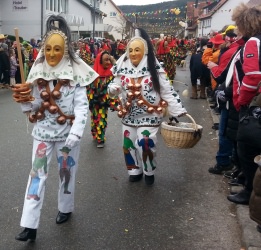
Thanks to the Internet, I was able to keep an eye on weather in the Pacific. A tropical low had formed north of Vanuatu and had moved southward between Vanuatu and Fiji, far from Tonga, which lies east of Fiji. When the low was south of Fiji and everybody thought that the threat was over, it started moving north-east over warmer water and deepened. It became a cyclone category two called Winston and Vava'u was directly on its path. From Germany, I was only able to keep in touch with emails as long as it was possible before the storm destroyed communications and hope, that it doesn't get too bad. Every so often, I opened the online weather maps and Winston did indeed move from Southwest to Northeast and pass very close to Tonga.
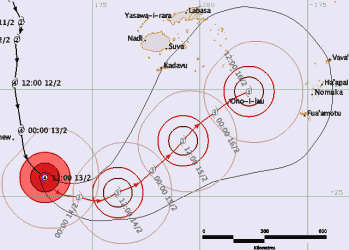 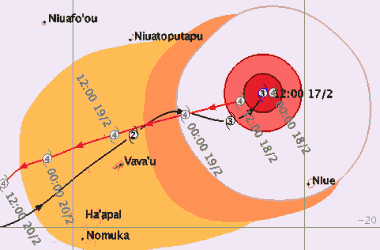 -These maps show the path the cyclone has taken in black, the red line is the predicted track, and the numbers show the category of the storm from 1-5. - Northeast of Vava'u Cyclone Winston stopped, intensified by rotating over the warm ocean water, then turned around and again aimed for Vava'u. He was upgraded to a cyclone category three, then four. Horrified I watched the development. There were several different forecasts on how close it would come to Vava'u, but at the very last moment the storm turned off slightly to the northwest, spared Vava'u this time and moved with full force as a category 5 cyclone directly over Fiji with 125 knots of wind, 240 km/h, in gusts 300 km/h (190 mph). -These maps show the path the cyclone has taken in black, the red line is the predicted track, and the numbers show the category of the storm from 1-5. - Northeast of Vava'u Cyclone Winston stopped, intensified by rotating over the warm ocean water, then turned around and again aimed for Vava'u. He was upgraded to a cyclone category three, then four. Horrified I watched the development. There were several different forecasts on how close it would come to Vava'u, but at the very last moment the storm turned off slightly to the northwest, spared Vava'u this time and moved with full force as a category 5 cyclone directly over Fiji with 125 knots of wind, 240 km/h, in gusts 300 km/h (190 mph).
Whole villages were eradicated, several lives lost. In Savusavu, where we had anchored with our sailboat years ago, every single yacht that was there, was stranded ashore or in the mangroves. Winston tore a path of destruction through the island chain of Fiji before moving south again and losing strength.
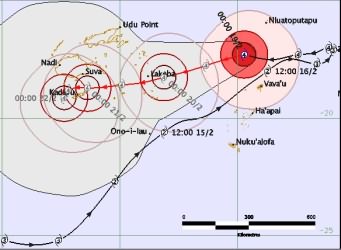 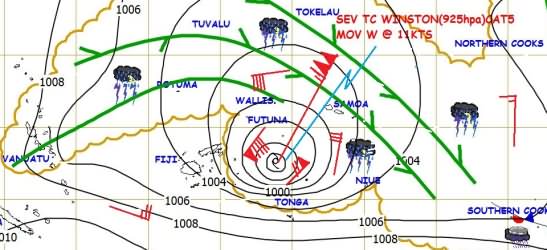 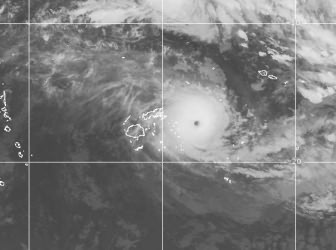
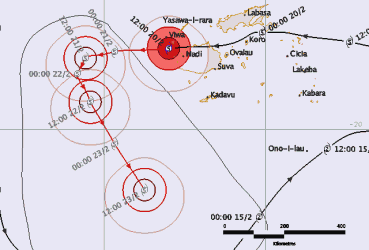 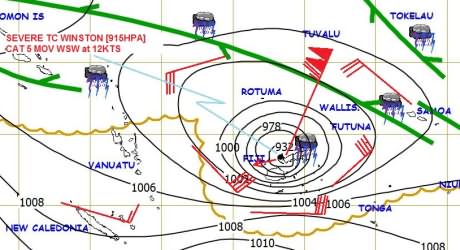 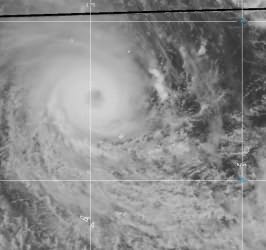
After the telephone and internet services were restored in Tonga, I received Werners report about the cyclone. When Winston approached, he had to move our boat from its mooring in the outer Blue Lagoon into the sheltered Hunga Lagoon. He tried several times to swim to the boat, but the current was already very strong and prevented him from boarding the boat several times. In a very risky maneuver he could manage to get aboard with the help of neighbor Boris and his boat, that has a strong 70 PS outboard. After throwing off the mooring line, the engine on our boat stopped working, but Boris could tow ANTAIA into the sheltered Hunga bay, where both boats luckily survived the storm.Afterwards the garden was pretty torn up by the wind, but we had no damage on the buildings. Boris was not so lucky, the terrace roof of his guesthouse was torn away and destroyed, but nobody was hurt and everybody glad, that Winston had not come back for a second time.
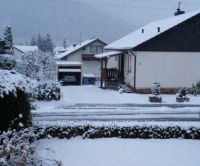 In early March it started to snow again in Germany and I was happy that I could finally get back to the tropics. On March 4. , Werner picked me up in Neiafu. The cyclone season was coming to an end and everybody was happy, that this El Nino season had not gotten any worse. In early March it started to snow again in Germany and I was happy that I could finally get back to the tropics. On March 4. , Werner picked me up in Neiafu. The cyclone season was coming to an end and everybody was happy, that this El Nino season had not gotten any worse.
The weather forecast on April 6. showed three small lows, but nothing serious. The next high water to bring ANTAIA over the reef into the sheltered lagoon was after dark, so we had to leave her on her mooring in Blue Lagoon in front of our property. In the night, there was a lot of wind and I could hear the waves crashing against the reef, I slept very badly, had an evil premonition, and was not astonished when Werner came in the morning and said, "the boat is gone." Despite the still very rough conditions, Boris with his boat and Werner went off to search for our boat. They didn't have to look far, just around the corner at the long beach ANTAIA was sitting already high and dry, they couldn't reach her from the boat. We had to run across the island to get to her. Unfortunately, she was stranded at the extreme end of the long sandy beach. There were sharp rocks above and below the water, and probably she had hit more rocks on the way, because her starboard side was badly damaged, the forward rail was bent and the aft one had some damage too. Fortunately, the outboard hanging there was ok and the port side too. There was a lot of water inside the boat and the three keels had dug deeply into the sand. Werner and Patrick scooped the sand away, put boards under the bow to get it off the sharp rocks and Werner put some plywood over the largest holes on the side. In the last moment we discovered, that there were also small holes under the waterline, which we tried to seal with epoxy putty.
When the tide started coming in,all the helpers gathered around the boat. Boris stood ready with his powerful motor boat to pull ANTAIA into the deep water as soon as she was floating. With the rising water it got rough again, the boat was thrown back and forth and all helpers had a hard time to prevent the boat crashing into the rocks again. Everybody was pushing, heaving and shoving and slowly the boat started floating, while Boris was pulling hard, until finally she was free and Werner and I could jump aboard. At first, the engine did not start, I was afraid that sand had entered the cooling water intake, Boris was still towing us, but that was difficult in the increasing wind and the high waves and the conditions got worse fast. Luckily, the engine fired up and we could get the boat into the sheltered Hunga Lagoon. We could not put it on our mooring there, because we didn't know, if the holes underwater were still leaking, but we could put her on a shallow spot near Barrys property and moor her with bowlines and anchors. Now she couldn't sink and Barry could watch her until the two following lows were through. There we also could pump out the salt water and close the other holes temporarily.
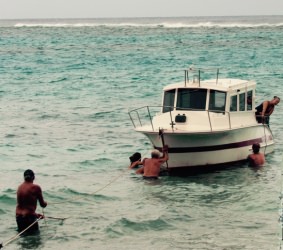 Two days later, we brought the boat back into Blue Lagoon and with everybody helping again, we got her onto her trailer in the still rough seas, pulled her ashore, and up into the boat shelter. Two days later, we brought the boat back into Blue Lagoon and with everybody helping again, we got her onto her trailer in the still rough seas, pulled her ashore, and up into the boat shelter.
Many thanks to Boris, Barry, Patrick, Ross, Red, Tom und Soane for all your help and to Karyn for her picture on the left of ANTAIA in the water, I was too busy to think about photographing.
Now we could thoroughly inspect the damages, clean the remaining salt water out and rinse the boat with fresh water. Werner immediately started to expertly repair the damages and we ordered new paint. After a few weeks, ANTAIA looked as new again.
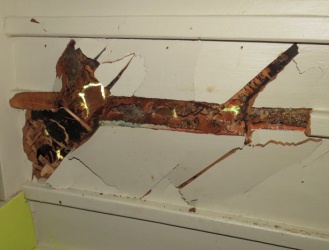 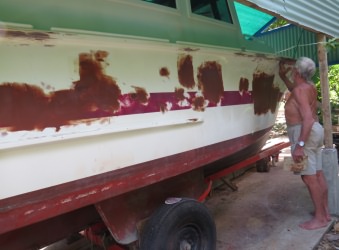 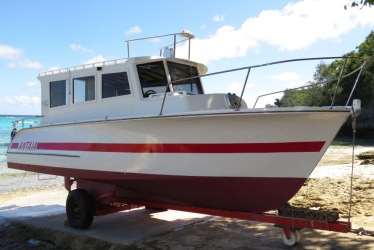
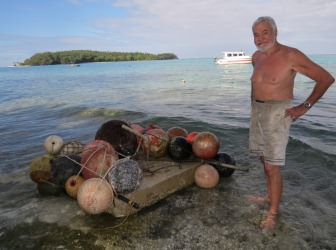
The broken mooring line we replaced with a brand new strong line and also exchanged shackles and chain. For safety, we made a second mooring block of concrete, which we poured on land and then tied many floats on and towed it with rising water out to the first block and connected the two together. Once again, we had learned the hard way, that the slightest negligence, like the confidence in a false weather report and an older line, can quickly develop into a misfortune.
In the meantime, the sailing season had begun and we met old friends again and made new acquaintances, but it was pretty quiet for us this season.
Werner wanted to build a canopy, but the ordered plastic roofing material he ordered months ago has still not arrived at the local building store. Maintenance work on the house and the boats as well as the usual gardening chores still kept us on track.
In September, Werner's son Ivo and his partner Linda visited us for 12 days. The weather was unusually hot and windless, so we sweated already at breakfast, but we could do a lot of sightseeing and especially water activities and ended our days with a relaxing sundowner at the beach.
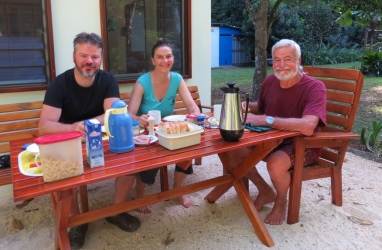 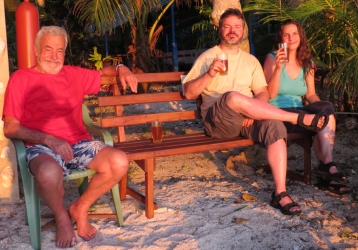 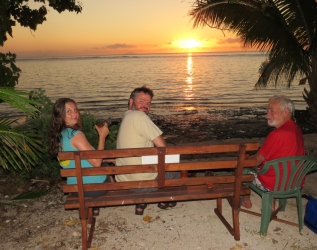
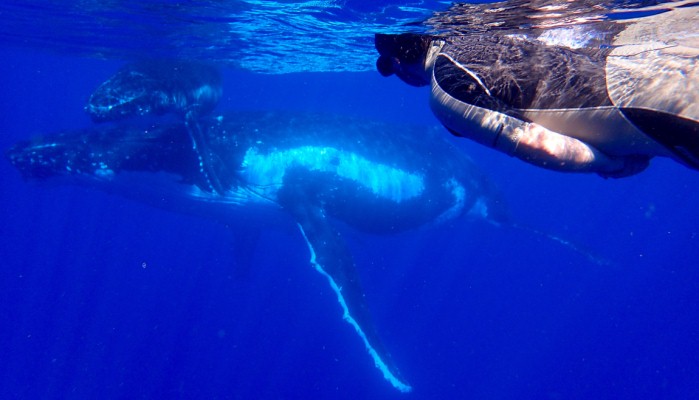 Our neighbors Karyn and Boris rent out guest bungalows and have a boat with which they offer licensed sport fishing, whale watching and swimming with whales. With them, Linda and Ivo could go out one day and were able to get really close to some young and adult humpback whales. Both were very enthusiastic and Karyn surely made great photos of their encounter, as seen here. Our neighbors Karyn and Boris rent out guest bungalows and have a boat with which they offer licensed sport fishing, whale watching and swimming with whales. With them, Linda and Ivo could go out one day and were able to get really close to some young and adult humpback whales. Both were very enthusiastic and Karyn surely made great photos of their encounter, as seen here.
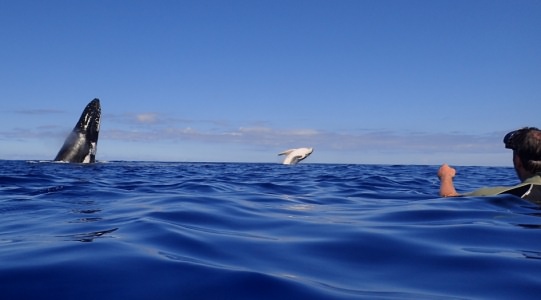
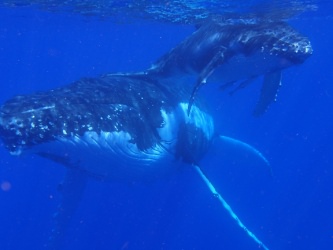 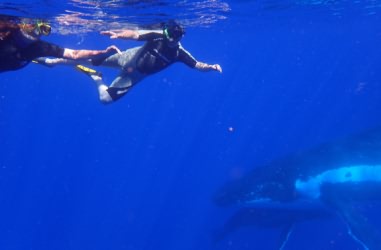 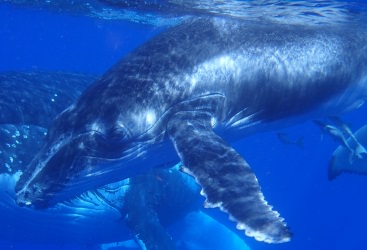
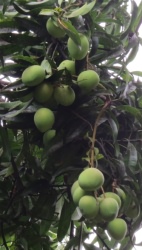 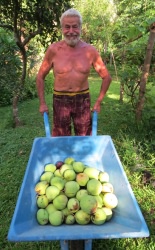 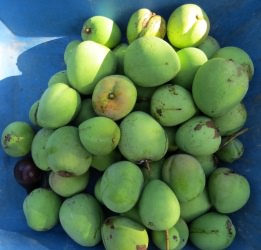 In early October, Ivo and Linda moved on to New Zealand for more adventures. We took care of house and garden again and the preparations for our next trip. In early October, Ivo and Linda moved on to New Zealand for more adventures. We took care of house and garden again and the preparations for our next trip.
We decided to fly to Hong Kong in mid-February and use a 7-day special offer from there to Taiwan, which was much easier and cheaper than booking directly through Taiwan. After that, we will spend 8 days in Hong Kong before flying to Germany in early March. In the middle of August we'll fly back to New Zealand and later to Tonga.
Beginning of December the first mangoes started to ripen and we picked them still green, before the flying foxes could start to eat them during their nightly raids.
Naturally, these quantities of fruit had to be turned into jam to make them last. We also make jam out of passion fruits, pineapples, papayas and other fruits, when we have too much of them.
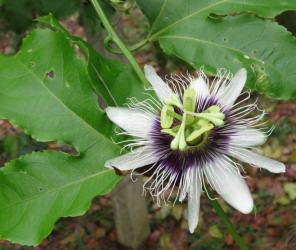 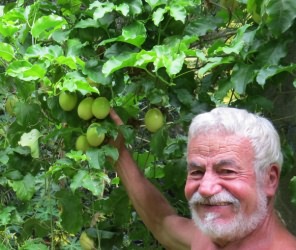 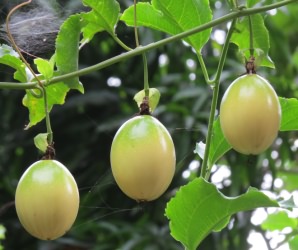 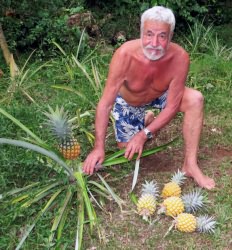 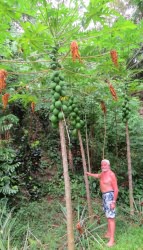
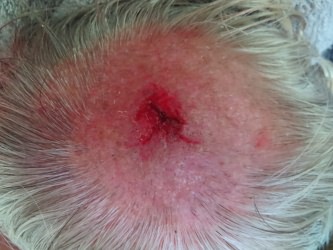
Saturday last week, Werner was picking green drinking coconuts from a palm tree at the beach. The ladder gave way in the soft sand and fell over, Werner landed with his head on a stone.
He had a nasty wound on his head, and at first was quite disoriented and couldn't remember what had happened. Karyn came to help and together we applied first aid and hoped that nothing more serious develops. Apart from back pain, which probably came from a strain, he felt no pain. The wound healed in the meantime without complications.. We call him Brother Werner now, because we had to cut him a tonsure to apply the butterfly plasters. Fun aside, it was quite a shock in the morning and made us all clear again, that we are dependent on ourselves out here.
For weeks now, it is well over 30 degrees C hot nearly every day, sometimes with the humidity being 95%,
pure sauna
and not much energy left
to do a lot of hard work. Werner found his old harmonica and is diligently practicing daily. 'Oh Christmas tree' and other Christmas songs already sound very good.
So far our "quiet" year 2016. In the moment, a low is developing near Vanuatu... . to be continued...
|

 I had to make a quick decision. If I took it lightly and was later blind in one eye, I could never forgive myself. On the other hand, with the neighbors still away, Werner was alone on the island. Fortunately, the Canadians Cindy and Barry, who live on the neighboring island of Hunga, and their helper Patrick, a nice Swiss, were still there. On the weekend nothing happens in Tonga, so we went to Neiafu on Sunday afternoon, where I could book a domestic flight to the main island Tongatapu for early Monday morning. There I went straight to the hospital in Nuku'alofa, where two doctors examined my eye with three different instruments after they had put very old eye drops in my eyes. They confirmed my suspicion but they couldn't do anything. I decided to fly via New Zealand to Germany. I had to wait a full day until I could fly out, every hour tearing on my nerves. After the flight to New Zealand and half a night at the airport I could still see, so I proceeded on to Hong Kong and Germany. Every so often lifting my black eyepad to check if I could still see. On Thursday morning, 6 o'clock European time, I arrived in Zürich and two hours later in the eye clinic in my hometown Tuttlingen. There, the eye was thoroughly examined by a woman doctor, again examined by someone else and in the end, the eye specialist himself had a look. Then he said very briefly, "This is not a retinal detachment, only a vitreous detachment, not very harmful, lots of old people have that". He made the impression, that he shouldn't be bothered with such a silly situation. Despite my relief, I felt a bit lectured. Then I was told by someone else, that a detachment of the vitreous body could also trigger a retinal detachment later, so I should remain in Germany for a while, to be sure everything is ok. After 5 days of travel, all the excitement, the expensive flights, the great mental tension, jet lag and sleep deficiency, and still half blind from the eye drops, I was just glad that my dad and my brother Ingo were there to take care of me. (Picture left and more info see
I had to make a quick decision. If I took it lightly and was later blind in one eye, I could never forgive myself. On the other hand, with the neighbors still away, Werner was alone on the island. Fortunately, the Canadians Cindy and Barry, who live on the neighboring island of Hunga, and their helper Patrick, a nice Swiss, were still there. On the weekend nothing happens in Tonga, so we went to Neiafu on Sunday afternoon, where I could book a domestic flight to the main island Tongatapu for early Monday morning. There I went straight to the hospital in Nuku'alofa, where two doctors examined my eye with three different instruments after they had put very old eye drops in my eyes. They confirmed my suspicion but they couldn't do anything. I decided to fly via New Zealand to Germany. I had to wait a full day until I could fly out, every hour tearing on my nerves. After the flight to New Zealand and half a night at the airport I could still see, so I proceeded on to Hong Kong and Germany. Every so often lifting my black eyepad to check if I could still see. On Thursday morning, 6 o'clock European time, I arrived in Zürich and two hours later in the eye clinic in my hometown Tuttlingen. There, the eye was thoroughly examined by a woman doctor, again examined by someone else and in the end, the eye specialist himself had a look. Then he said very briefly, "This is not a retinal detachment, only a vitreous detachment, not very harmful, lots of old people have that". He made the impression, that he shouldn't be bothered with such a silly situation. Despite my relief, I felt a bit lectured. Then I was told by someone else, that a detachment of the vitreous body could also trigger a retinal detachment later, so I should remain in Germany for a while, to be sure everything is ok. After 5 days of travel, all the excitement, the expensive flights, the great mental tension, jet lag and sleep deficiency, and still half blind from the eye drops, I was just glad that my dad and my brother Ingo were there to take care of me. (Picture left and more info see 









 -These maps show the path the cyclone has taken in black, the red line is the predicted track, and the numbers show the category of the storm from 1-5. - Northeast of Vava'u Cyclone Winston stopped, intensified by rotating over the warm ocean water, then turned around and again aimed for Vava'u. He was upgraded to a cyclone category three, then four. Horrified I watched the development. There were several different forecasts on how close it would come to Vava'u, but at the very last moment the storm turned off slightly to the northwest, spared Vava'u this time and moved with full force as a category 5 cyclone directly over Fiji with 125 knots of wind, 240 km/h, in gusts 300 km/h (190 mph).
-These maps show the path the cyclone has taken in black, the red line is the predicted track, and the numbers show the category of the storm from 1-5. - Northeast of Vava'u Cyclone Winston stopped, intensified by rotating over the warm ocean water, then turned around and again aimed for Vava'u. He was upgraded to a cyclone category three, then four. Horrified I watched the development. There were several different forecasts on how close it would come to Vava'u, but at the very last moment the storm turned off slightly to the northwest, spared Vava'u this time and moved with full force as a category 5 cyclone directly over Fiji with 125 knots of wind, 240 km/h, in gusts 300 km/h (190 mph). 



 In early March it started to snow again in Germany and I was happy that I could finally get back to the tropics. On March 4. , Werner picked me up in Neiafu. The cyclone season was coming to an end and everybody was happy, that this El Nino season had not gotten any worse.
In early March it started to snow again in Germany and I was happy that I could finally get back to the tropics. On March 4. , Werner picked me up in Neiafu. The cyclone season was coming to an end and everybody was happy, that this El Nino season had not gotten any worse.  Two days later, we brought the boat back into Blue Lagoon and with everybody helping again, we got her onto her trailer in the still rough seas, pulled her ashore, and up into the boat shelter.
Two days later, we brought the boat back into Blue Lagoon and with everybody helping again, we got her onto her trailer in the still rough seas, pulled her ashore, and up into the boat shelter. 
 Our neighbors Karyn and Boris rent out guest bungalows and have a boat with which they offer licensed sport fishing, whale watching and swimming with whales. With them, Linda and Ivo could go out one day and were able to get really close to some young and adult humpback whales. Both were very enthusiastic and Karyn surely made great photos of their encounter, as seen here.
Our neighbors Karyn and Boris rent out guest bungalows and have a boat with which they offer licensed sport fishing, whale watching and swimming with whales. With them, Linda and Ivo could go out one day and were able to get really close to some young and adult humpback whales. Both were very enthusiastic and Karyn surely made great photos of their encounter, as seen here. 



